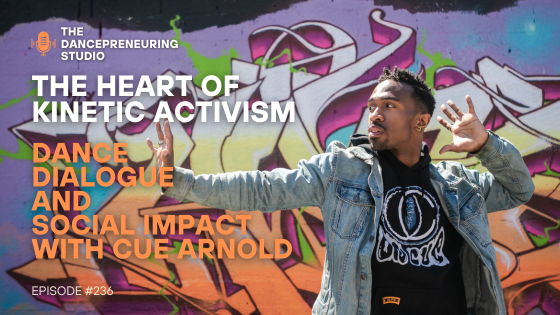The Heart of Kinetic Activism: Dance, Dialogue and Social Impact with Cue Arnold
“Movement is a language. And if I can open up vulnerability and empathy in both of us, then I can help shift us toward uplifting the historically oppressed.” – Cue Arnold
What does it mean to embody activism through art? How can dance not only express but shift the cultural narrative toward justice, healing, and empowerment?
This deeply engaging conversation with Quilan “Cue” Arnold—choreographer, educator, and founder of OnCue Chronicles—explores the powerful intersections of dance, dialogue, and social impact. Cue invites us into his growing philosophy of “searching, sharing, and shifting”—a framework that integrates biblical, Pan-African, and hip hop traditions with contemporary movement practices.
From his early inspirations on the battle floor to the development of his kinematic universe, Lowlyfe, Cue demonstrates how choreography can become a vessel for storytelling, liberation, and restoring ancestral memory. His work inspires us to face cultural erasure, to feel empathy, and to answer the call Martin Luther King made to creative minorities who shift the unmoved majority.
This episode is both practical and profound, reminding us that movement—whether in the studio, classroom, or community space—is not just a physical act but a spiritual and social one.
A Few Key Takeaways
- Dance as a Language of Empathy and Justice
Cue sees movement as a tool to open both performer and audience to vulnerability, compassion, and cultural truth. By doing so, he seeks to shift collective consciousness toward equity and justice.
- The “Creative Minority” as Change Agents
Inspired by Martin Luther King Jr., Cue embraces the role of the artist as someone who bridges the gap between apathy and action, reminding us that creativity itself is an act of resistance against indifference.
- Teaching Movement Beyond Technique
Whether in hip hop drop-in classes or academic settings, Cue integrates journaling, embodiment, and critical dialogue to show students that dance is not only fun—it’s a pathway to identity, history, and social awareness.
- Reimagining Narrative Through Lowlyfe
Cue’s latest project fuses cinema, character development, and kinetic storytelling to create an Afro-American mythology that blends the aesthetic impact of WWE with the soul of hip hop culture.
- Collaboration as Spiritual and Creative Practice
Working alongside artists in film, music, and costume design, Cue emphasizes the transformative magic of collaboration—where multiple disciplines converge into something greater than the sum of their parts.
- From Competition to Community
Though Cue values the fire of the battle scene, his current focus is on creating spaces of unity and healing, encouraging dancers to expand beyond win/lose frameworks into collective empowerment.
Links/Credits Mentioned in this Episode
Follow Cue Arnold on Instagram: @beoncue
Learn more about OnCue Chronicles + Lowlyfe: beoncue.com
Mentioned inspirations: Martin Luther King Jr.’s concept of the creative minority, hip hop elders, and the storytelling craft of WWE.
Collaborators on Lowlyfe:
Milan Misko (cinematographer/editor)
YNOT (composer, sound designer)
Roobi Gaskins (costume designer)
Other episodes of interest:
#230 From Roots to Liberation: Empowerment in ink by Camille A. Brown & Dancers
#214: How to Be A Better Dance Artist
#142 Success Isn’t Always a Straight Line
Whether you’re a dancer, creative activist, or someone seeking inspiration on how art can shift culture, this episode is a masterclass in purpose-driven artistry.
🎙️ What movement or dance form best matches your mood right now—and why? Cue chose New Jack Swing for its jubilant energy. I’d love to hear yours!
Connect with me on Instagram @annettbone and continue the conversation.


